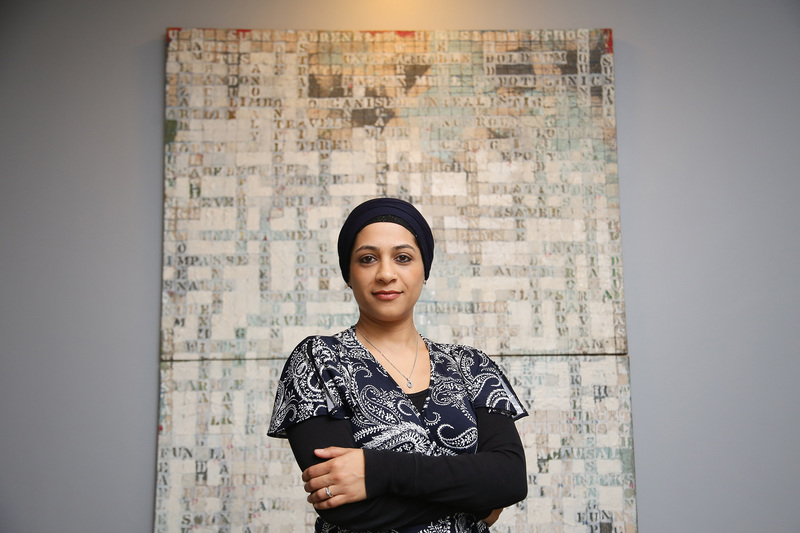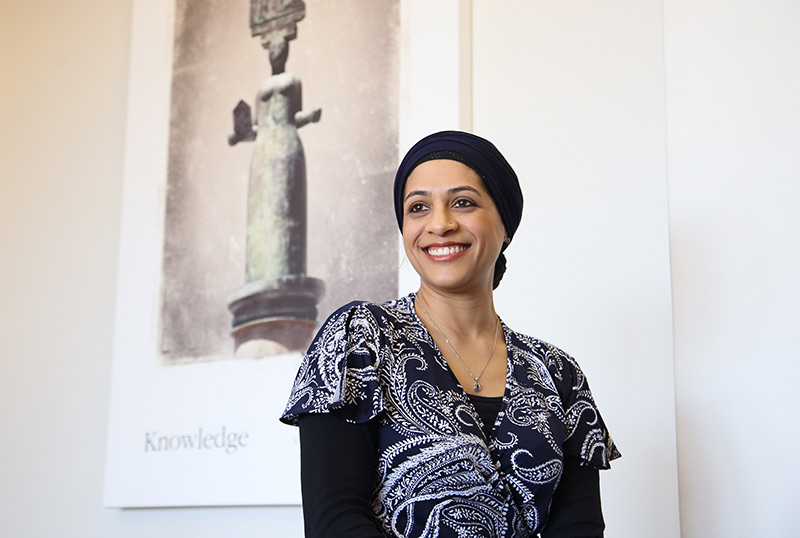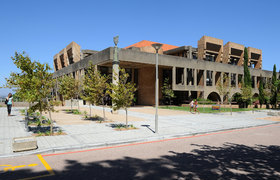Women’s Month: Confronting legal dissonance in South Africa
12 August 2021 | Story Nadia Krige. Photos Je’nine May. Read time 6 min.
When talking about the successes and failures of South Africa’s rule of law, there is a tendency to focus on the top tiers of the judiciary, particularly the Constitutional Court of South Africa and the high courts. Jameelah Omar, a senior lecturer in the Department of Public Law at the University of Cape Town (UCT), argues that if you really want to know how well our democracy is working, you simply need to visit a magistrate’s court on a Monday morning, or spend a weekend locked up in a police holding cell.
“Ninety per cent of people encounter the law through the police and the magistrate’s courts,” said Omar, whose expertise lies in the field of criminal justice. “They will never see the Constitutional Court. It has next to zero impact on their daily lives, even though important cases may eventually trickle down.”
With a strong bent toward social justice, Omar’s work focuses on scrutinising the status quo of law in South Africa and asking critical questions about who benefits and who does not.
She argues that although South Africa has a truly progressive constitution, the extent to which these laws actually work in practice falls far short of the ideal.
“What I find stimulating about criminal justice is that it just brings all of that nice stuff about our amazing constitution and the Constitutional Court’s great judgments crashing down,” said Omar.
“What you’re left with is the reality that yes, we have great laws; but we also have serious problems.”
Inequality, our greatest challenge
A poignant and timely example of Omar’s assertion is the recent spate of looting in Gauteng and KwaZulu‑Natal, and both government and civil society’s reaction to it.
Although most reports, conversations and official statements acknowledge the fact that mass poverty, unemployment and growing inequality were major driving forces behind the events, there was also widespread disapproval of the government’s delay in deploying the police and the army to restore the rule of law.
“Inequality is the original wrong.”
“My opinion is: When you have to bring in the police and army, it probably means that your rule of law lacks legitimacy,” said Omar.
“You’ve got people who have lost their jobs, who have never in their lifetime had a job, who are struggling to feed their children [and] pay for basic things, and are now stealing basic goods. And our response to that [is that] we need to maintain the rule of law by arresting them? I think we’ve lost the plot. It’s not that stealing, etc. is right; it’s that inequality is the original wrong.”
Rethinking justice
In her PhD thesis – which she hopes to finish later this year – Omar focuses on another group that find themselves largely disempowered by the rule of law: sexual offence complainants.
To set the scene, Omar shares a few statistics: in the previous reporting year (2019–2020), about 50 000 rape cases were reported. Out of those, only about 10% were prosecuted; and out of those, only about 50 to 70% were successfully prosecuted (meaning they resulted in a guilty verdict).
Furthermore, in the adversarial system, which South Africa inherited from English law, the complainant is simply a witness and not party to proceedings at all, possibly creating a further sense of disempowerment.
“Part of my work is looking at the psychological impact of not being involved in your own matter; and what does that do for a sense of justice for complainants?” explained Omar.

While she believes that the criminal trial serves an important purpose in establishing the guilt of the accused, Omar questions its ability to offer victims of sexual offences a sense of justice.
“If that is where you get justice, we’re saying that only 10% of cases are going to get a chance at justice, and the other 90% are not even in the running.”
Instead, Omar suggests finding ways to expand the current adversarial system to focus more on empowering the complainant and working towards justice.
Confronting our issues
Despite the weightiness of her work, Omar is not without hope.
“There is always hope,” she said. “But we’re going to have to start by confronting our country’s big issues head‑on, instead of just referencing them.”
Certainly easier said than done; but one of the ways Omar is working towards this is through her role as convenor of the LLB community service programme. As a compulsory component of their degree, all LLB students need to spend a set number of hours volunteering at a law clinic, organisation or NGO.
Since taking on the convenor role at the start of 2020, Omar’s focus has been on adequately preparing students through a series of seminars, and helping them find good-quality projects where they can contribute and gain in equal measure.
“I think a lot of students see this kind of community service as just charity, or just giving back, or even just social justice,” she said. “But actually, it’s a very important learning tool.”
Crucially, it also offers students the opportunity to confront the dissonance between the country’s excellent written laws and their everyday execution for all in South Africa.
While not everyone will walk away from the experience with a burning passion for social justice, the skills students gain in critical thinking and navigating complex social spaces are invaluable in shaping a next generation of South African lawyers.
 This work is licensed under a Creative Commons Attribution-NoDerivatives 4.0 International License.
This work is licensed under a Creative Commons Attribution-NoDerivatives 4.0 International License.
Please view the republishing articles page for more information.










